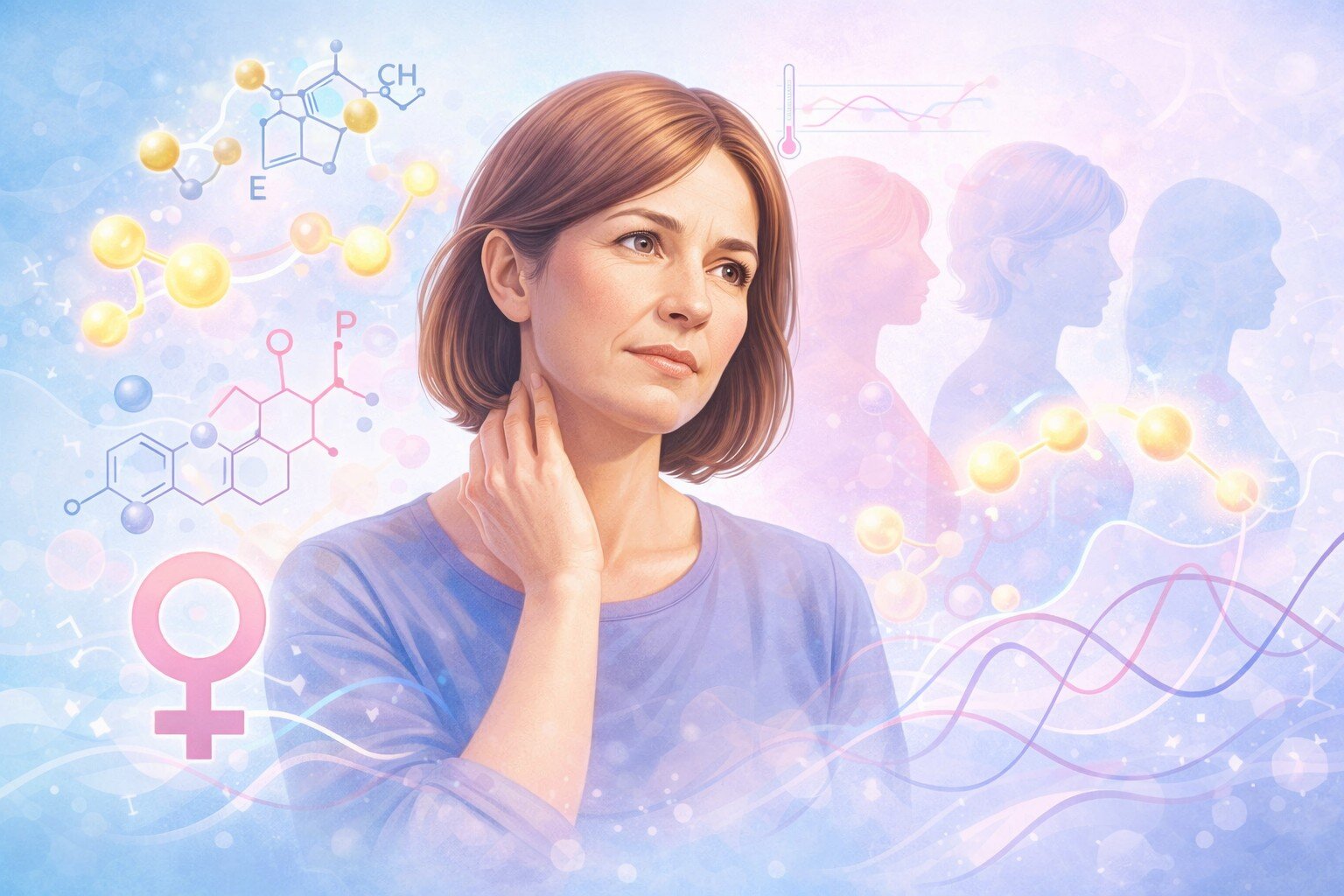Get In Touch With Us

Hormone Imbalance in Women Over 40: Revitalize Vitality
Reclaiming Your Vitality: Navigating Hormonal Imbalance and Hormone Health for Women Over 40
For many women, turning 40 marks the beginning of a new, powerful chapter defined by self-awareness and wisdom. However, it can also bring a host of confusing and frustrating changes to your body and mind, from sudden weight gain to inexplicable mood shifts and sleep disruptions.
This is often due to a significant shift in your hormone levels. The resulting imbalance in women over 40 can impact everything from your energy to your mood to your waistline.
This article will demystify the complex world of female hormones, exploring why these changes happen, what symptoms they cause, and how you can reclaim your vitality. Understanding the hormone shifts occurring within your body is the first step toward managing your health after 40 and embracing this new stage of life with confidence and strength.
Why Do Hormone Imbalances Commonly Occur in Women Over 40?
As women enter their 40s and beyond, their bodies go through a natural transition called perimenopause and menopause, driven by changes in hormone levels. Estrogen and progesterone, produced by the ovaries, start to decline and fluctuate unpredictably.
This isn’t a sign of illness but a normal part of aging that marks the end of reproductive years. These hormone shifts can cause symptoms many women experience during this phase.
This drop in hormones also affects more than just periods. Estrogen, for example, plays a role in bone health, heart function, mood, and metabolism. When it falls, these areas can be impacted, leading to feelings of lost vitality. The body tries to adjust by releasing more hormones like FSH to stimulate the ovaries, which adds to the hormonal ups and downs.
These changes start slowly but become stronger as menopause approaches, ending menstruation and pushing the body to find a new hormonal balance.
What Are the Key Hormonal Changes During Perimenopause and Menopause?
How Does a Hormone Imbalance Affect Physical Health After 40?
Hormone imbalances during menopause can really affect a woman’s quality of life. One big concern is bone and muscle health. Estrogen helps keep bones strong, so when it drops, the risk of osteoporosis (a condition where bones become weak and fragile) increases a lot. Loss in muscle weight can also affect strength and mobility.
These hormone changes also impact heart and joint health. Estrogen protects the heart and blood vessels by keeping them flexible and helping control cholesterol. When estrogen drops, risks for heart disease, high blood pressure, and bad cholesterol go up.
Other common issues include vaginal dryness, urinary problems, thinning hair, dry skin, and night sweats or hot flashes that mess with sleep and energy. These symptoms together can make this phase of life physically tough.
Can These Hormonal Changes Impact Mental and Emotional Well-being?
Absolutely!
Hormones have a big impact on the brain, and the changes women go through can really affect their mood and emotions.
Estrogen helps regulate chemicals like serotonin and dopamine that keep mood steady and make us feel good. When estrogen drops, it can cause fatigue, irritability, anxiety, and even depression. Progesterone, which usually helps calm anxiety, also falls, leading to mood swings or “meno-rage.” These feelings aren’t your fault—they’re just how the body reacts to changing hormones.
On top of that, symptoms like poor sleep from night sweats and low energy make emotional struggles worse. Lack of sleep can increase anxiety, sadness, and cause trouble remembering things or focusing (“brain fog”).
What Is the Connection Between Gut Health and Hormonal Balance?
Your gut microbiome plays a big role in managing hormones, especially estrogen. A group of gut bacteria called the “estrobolome” produces an enzyme that helps balance estrogen by processing it properly.
When your gut is healthy, this system works well, making sure estrogen is either reused or safely removed. But if your gut is out of balance (called dysbiosis), it can mess up this process, causing too little or too much estrogen in your body.
That’s why taking care of your gut is key to keeping hormones balanced. Things like eating lots of ultra-processed foods, stress, low fiber, and antibiotics can harm your gut bacteria. This not only causes common gut issues like bloating and constipation but also throws off hormone regulation by increasing inflammation. Eating foods rich in prebiotic fiber (like onions, garlic, and asparagus) and probiotics (like yogurt, kefir, and kimchi) supports a healthy gut and helps your body keep hormones in check.
Which Lifestyle Changes Can Positively Influence Hormone Health?
Lifestyle changes can help support your body and balance hormones!
Eating whole foods is key—lean protein helps keep muscle, healthy fats like avocado and olive oil support hormone production, and veggies and whole grains provide steady energy. Cruciferous veggies (like broccoli) help your body process estrogen, and foods with phytoestrogens (like flaxseeds and soy) may ease symptoms. Avoid too much added sugar, alcohol, and ultra-processed foods since they can cause inflammation and hormone problems.
Exercise is important too. Cardio helps your heart and mood, while strength training builds muscle, improves metabolism, and boosts bone health. Managing stress matters because high cortisol can mess with sleep and hormones. Yoga, meditation, deep breathing, or time outside can help you relax.
And getting 7-9 hours of good sleep each night is essential for your body to heal and keep hormones balanced. These habits can naturally support hormone health during menopause.
How Can I Begin the Journey to Restore Hormonal Balance?
Getting started with better hormone health means recognizing your symptoms and learning more. Track things like energy, mood, sleep, periods, and any physical changes. This info helps when you talk to a doctor who understands hormone issues, especially in women over 40. They can run tests like thyroid, insulin, vitamin D, and hormone levels to find the cause.
From there, you can build a personalized plan focusing on diet, exercise, and stress management. For some, lifestyle changes are enough. Others might benefit from hormone therapy. The key is a plan that fits you and evolves over time. With the right care, you can manage this transition and feel your best.
Key Takeaways to Remember
- Hormones Are Messengers: Hormones play a vital role as chemical messengers regulating nearly every bodily function. An imbalance occurs when hormone levels are too high, too low, or in the wrong ratio, impacting your overall health.
- Age is a Major Factor: For women over 40, hormonal imbalance is a natural part of the aging process, driven by the fluctuating and eventual decline of estrogen and progesterone during perimenopause and menopause.
- Symptoms Are Widespread: The effects are not just physical (hot flashes, weight gain, risk of osteoporosis) but also mental and emotional (mood swings, brain fog, anxiety, and depression).
- Lifestyle is a Powerful Tool: You can support your hormones naturally through a balanced diet rich in protein and fiber, regular exercise (especially strength training), consistent stress management, and prioritizing gut health.
- Weight Management is Challenging but Possible: Declining hormone levels can slow metabolism and encourage belly fat storage, but proactive diet, exercise, and stress-reduction strategies can combat this common symptom.
- Professional Help is Available: Don’t hesitate to seek medical advice from a menopause-informed provider. They can help diagnose your unique hormonal situation and discuss treatment options, including whether hormone replacement therapy is a safe and effective choice for you.
Disclaimer: This article is for educational purposes only. Please consult your healthcare provider for personalized medical advice.


